
Imogen Fanning
Sustainable Business Project Analyst
A journey through data, experiences, and insights on palm oil transparency, reflecting on both the progress made and the gaps remaining in addressing deforestation
When I first started working on SPOTT, I never imagined the scale of what palm oil production entails, from the vast plantations stretching across tropical landscapes to the intricate supply chains that connect small-scale farmers to global markets. The sheer impact of this industry on biodiversity, people, and global sustainability goals is both daunting and a powerful motivator to drive change through transparency and accountability.
This drive for change has been at the heart of SPOTT’s mission since its inception. This year, we are marking a significant milestone for SPOTT: 10 years of assessing and encouraging transparency in the palm oil sector. Over the past decade, SPOTT has provided a vital lens into how companies are addressing the urgent challenges of deforestation, biodiversity loss, and social responsibility. Our 2024 assessment of palm oil companies—highlighted in our press release—reveals the sector’s mixed progress, with more than half of assessed companies still lacking adequate policies to halt deforestation—despite the global commitment made at the UN COP26 to end and reverse deforestation by 2030.
Reflecting on a decade of data, we've seen measurable improvements in areas like NDPE (No Deforestation, No Peat, No Exploitation) policies and supply chain traceability. However, the pace of progress is uneven, and the latest results show significant gaps remain in corporate commitments to sustainability.
The complexity of tracing deforestation footprint of palm oil supply chains
In the tropical regions of Southeast Asia, vast oil palm plantations have replaced extensive rainforests, particularly across Indonesia and Malaysia. This deforestation, driven by growing global demand for the oil-rich fruits of the oil palm (Elaeis guineensis), continues to threaten vital habitats, biodiversity, and the global climate. Once harvested, the bright orange fruits are transported to mills, where crude palm oil is extracted—a versatile ingredient used in a wide range of products, from food and cosmetics to biofuels.
From the mills, crude palm oil embarks on a complex journey to refineries and exporters, before reaching supermarket shelves or industrial facilities worldwide. This supply chain is mirrored in other tropical regions, including Africa and Latin America, where palm oil production is expanding, often at the expense of forests.
The complexity of palm oil supply chains makes it challenging to trace its impacts, particularly deforestation, back to their source. Despite layers of regulations and sustainability standards, the lack of transparency and gaps in company reporting continue to obscure the true cost of production. Deforestation remains a critical issue requiring greater accountability and systemic change within the palm oil industry.

A Personal Journey: Insights from the Field
My involvement with SPOTT has been both a professional and personal journey. Leading the assessments for the past four years has given me insight into the sector's complexities across ESG issues. Over the past decade, SPOTT has grown from being a data-driven initiative into a trusted resource for investors, consumers, and civil society organisations. It’s rewarding to be part of this evolution, yet it’s also a sobering reminder of how much remains to be done.
My own interest in the complexities of sustainable palm oil started during university, where I developed a palm oil ESG metric to analyse the products sold on campus for my undergraduate dissertation project. That experience opened my eyes to the potential of data to quantify and compare impacts. A few years later, visiting a palm oil plantation in Peninsular Malaysia cemented my understanding of the industry’s duality: the miles of plantations I saw from the plane window represented both economic opportunity and environmental degradation.
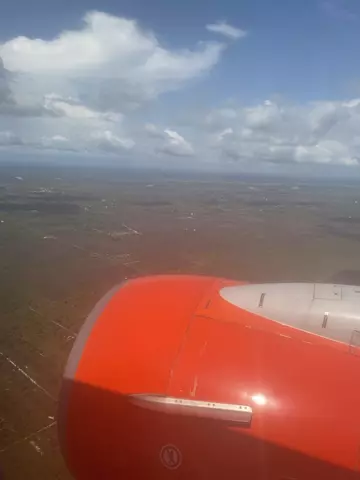
Travelling around Malaysia, I witnessed the benefits brought by palm oil—schools, roads, and livelihoods funded by the industry. But these gains come with trade-offs. In Central Kalimantan, I visited smallholder communities struggling to earn enough from palm oil farming, with some turning to more destructive industries like mining to make ends meet. These human stories are a reminder of why SPOTT’s work—bringing transparency to these interconnected issues—is so critical.
10 years of data: Progress and gaps in palm oil deforestation commitments
Looking back on 10 years of SPOTT assessments, the data serves as a powerful accountability tool. Year-on-year, we’ve challenged companies to improve their practices, holding a mirror up to the sector and highlighting progress and gaps in ESG reporting.
In 2014, SPOTT began tracking companies’ deforestation policies and practices in response to growing global concern over the environmental impacts of palm oil production. This followed years of increasing deforestation rates, high-profile campaigns by NGOs, and heightened public awareness driven by events like the Southeast Asian haze crisis, which brought the devastating consequences of forest fires into sharp focus. Recognising the urgent need for greater transparency and accountability in the industry, SPOTT initially assessed companies’ varying approaches to deforestation.
By 2017, SPOTT had refined its methodology to focus on clear, measurable zero-deforestation commitments. At that time, only 29 out of 50 assessed companies had adopted such pledges. Today, 51 out of 81 companies have made zero-deforestation commitments, reflecting progress in the sector. However, SPOTT's assessments consistently reveal significant gaps between company commitments and their implementation on the ground, highlighting the critical need for transparency to drive meaningful change. With SPOTT-assessed palm oil companies managing at least 8.4 million hectares of tropical forests—an area larger than Austria—there is immense potential for these commitments to drive significant global impact if fully implemented.
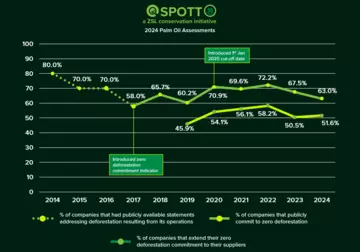
Whilst it’s encouraging that more than half of assessed companies provide evidence of monitoring deforestation in their operations – a 31% increase since this indicator was introduced – there are still persistent gaps that continue to threaten global goals. Only 24.74% extend this monitoring to their suppliers, highlighting the urgent need for a comprehensive approach that holds all parts of the supply chain accountable and ensures commitments translate into action on the ground.
Media Monitor: Adding Context to SPOTT Assessments
In addition to the assessment results, SPOTT also recognises the importance of capturing on-the-ground realities, which is why the Media Monitor has been an integral feature from the start.
The Media Monitor continuously tracks global media reports of SPOTT-assessed companies related to key ESG issues such as deforestation, biodiversity loss, and social impacts. While SPOTT does not evaluate the validity of individual media reports, the Media Monitor provides users with invaluable context, highlighting potential risks and offering insights into how companies' policies translate into practice.
Since 2014, the Media Monitor has identified 749 negative media articles related to deforestation and biodiversity—more than any other ESG category. Notably, this includes reports implicating companies with zero-deforestation commitments, underscoring a critical gap between policy and practice. These findings highlight the importance of downstream buyers and investors going beyond policy reviews to conduct thorough due diligence, as actions on the ground often tell a more complex story.
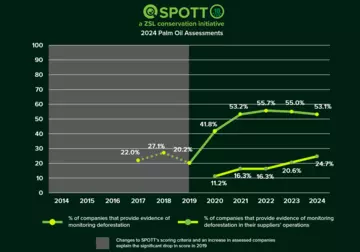
In our free training, we explore practical ways for investors and buyers to connect the dots between the Media Monitor, corporate disclosures, and other tools, helping them make informed decisions and have more meaningful engagement with palm oil companies. We also dive into palm oil as a commodity, unpacking ESG risks in the sector and discussing strategies to mitigate these challenges.
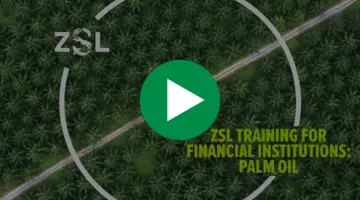
RSPO and the Role of Certification in Advancing Sustainability in the Palm Oil Sector
Once a year the Roundtable on Sustainable Palm Oil (RSPO) hosts a conference which brings together stakeholders from across the sector to discuss salient issues and foster collaboration. I was lucky enough to attend this year’s meeting in Bangkok where the focus was on innovation to drive sustainability and build resilience in the industry. The RSPO also plays a pivotal role in tackling deforestation in the palm oil sector. Its Principles and Criteria set standards for preventing forest loss, including the protection of High Conservation Value (HCV) areas and High Carbon Stock (HCS) forests. By offering a certification system, RSPO provides a framework for verifying compliance with sustainability practices, enabling growers and downstream businesses to demonstrate progress towards more responsible palm oil production.
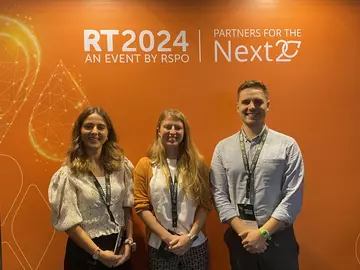
While RSPO certification is an important step, companies must go further by embedding no-deforestation commitments, improving reporting of practices, and investing in landscape-level conservation to ensure long-term sustainability and forest protection.
Looking Ahead: Turning Commitments into Action
As SPOTT enters its second decade, the need for transparency and accountability in the palm oil sector has never been more urgent. This year’s assessment reminds us that while progress has been made, it’s not enough. Deforestation continues, and companies must step up to align with global sustainability goals. At the same time, we must ensure that smallholders and local communities are supported in their transitions toward sustainable practices.
What gives me hope is the growing recognition of the power of transparency. Over the past 10 years, SPOTT’s work has inspired meaningful changes in corporate behaviour and provided critical tools for investors and NGOs. This year alone, 50% of companies have improved their disclosure scores following our engagement. For me, these numbers reflect not just challenges but opportunities - proof that transparency can lead to action.
Join Us in Driving Change
Explore the full results of SPOTT’s 2024 palm oil assessments here. A decade of SPOTT data has shown us that transparency can catalyse change. With your support, we can continue pushing for an industry that benefits people, biodiversity, and the planet.
Over the past 10 years, SPOTT has driven change, assessing 230 companies managing over 65 million hectares of tropical forest landscapes. But we need your help to do more.
Support ZSL's SPOTT initiative as a sponsor and drive transparency and sustainability in supply chains.
